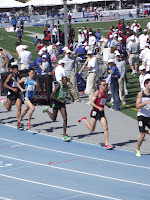 The thing that stuck out to me the most when reading the book is how open and honest Hall is about his training and emotions. The role that the mental side plays in running is often times overlooked, especially with professionals who we hold to a higher standard. That's why when star athletes choke on the big stage they get little sympathy. But even on the elite level these guys are still human and deal with all the same emotions that me and you have. I've seen it time and time again the key to running well is not just putting in the training but being ready on the specific day with the correct frame of mind. More often than not it's not a lack of training but a lack of mental preparation that holds runners back on race day. Many times as runners we can feel isolated, after all you can;t tell that the other guy is hurting just as much as you, or that your not the only one in the world dealing with an injury. Hall's book takes you inside the mind of the professional athlete, along the way revealing that it's not so different from the mind of you and me.
The thing that stuck out to me the most when reading the book is how open and honest Hall is about his training and emotions. The role that the mental side plays in running is often times overlooked, especially with professionals who we hold to a higher standard. That's why when star athletes choke on the big stage they get little sympathy. But even on the elite level these guys are still human and deal with all the same emotions that me and you have. I've seen it time and time again the key to running well is not just putting in the training but being ready on the specific day with the correct frame of mind. More often than not it's not a lack of training but a lack of mental preparation that holds runners back on race day. Many times as runners we can feel isolated, after all you can;t tell that the other guy is hurting just as much as you, or that your not the only one in the world dealing with an injury. Hall's book takes you inside the mind of the professional athlete, along the way revealing that it's not so different from the mind of you and me. Like I said earlier Hall basically lays out his entire training plan, the book essentially reads like an edited version of his training log. Although his book is much more thorough than any training log I've ever seen! In addition to his training, Hall offers advice on just about any subject related to running including; diet, rest, clothing, shoes, and even blisters. Most of the advice is fairly common knowledge but Hall does put an interesting spin on a few topics, in particular laying out some of his own favorite books.
One problem I had with the book was Hall's constant reference to scripture, which I believe doesn't belong in a book like this. But its Hall's book and he can do what he wants. Hall is often criticized for his outspoken religious beliefs, a practice that makes him essentially the Tim Tebow of running.
Despite my criticism Hall's book is certainly a worthwhile read, and fairly quick at a little over 200 pages. I would recommend this book to runners of all levels especially those who have a hard time understanding the things Hall does sometimes, which includes myself. Running with Joy offers a brief glimpse into what the life of a professional marathoner is really like.
Link to Chapter 1 free!
http://runningwithjoy.com/downloads/running-with-joy-chapter1.pdf

